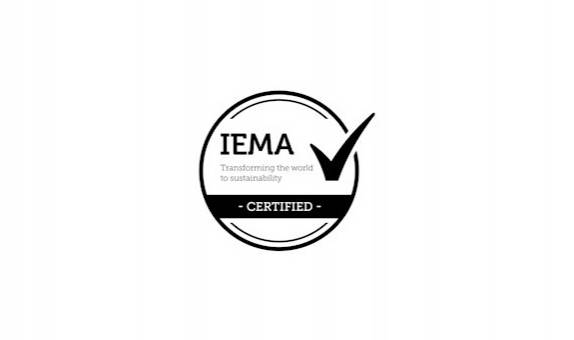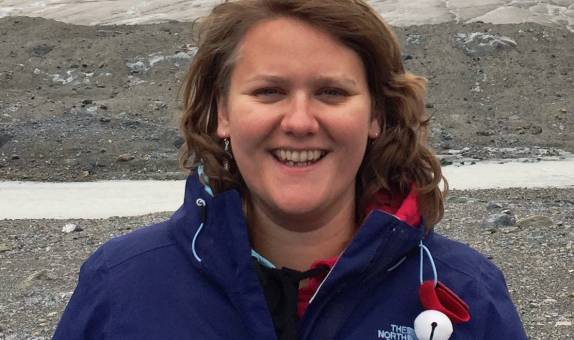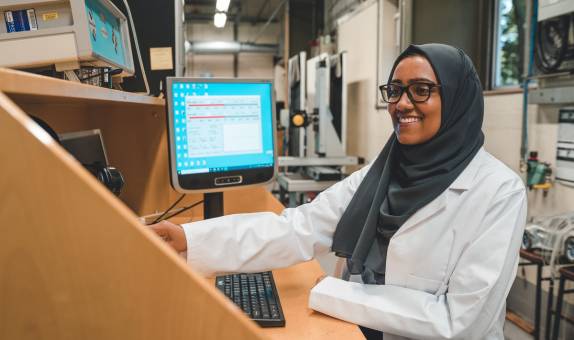Environmental Science BSc (Hons) Degree Apprenticeship

Teaching Excellence Framework (TEF) Gold award
Our commitment to high quality teaching has been recognised with a TEF Gold rating. The University has received an overall rating of Gold, as well as securing a Gold award in the framework's two new student experience and student outcomes categories.
Why choose this programme?
Are you considering a career in the environmental sector? Would you like to find sustainable solutions to environmental challenges such as climate change, development pressures, resource use and environmental pollution?
You'll learn to investigate, monitor, evaluate and understand environmental systems and to predict and respond to environmental challenges.
This programme is highly practical; day and residential field trips will help you develop your field-based research skills from Level 4 to Level 6. You'll work on an independent research project based on an industry problem identified by your employer. This will combine your own environmental science interests with those of your employer.
One day a week will be at university rather than your place of employment. There will also be learning activities at your workplace. The programme leads to a BSc (Hons) Environmental Science (Degree Apprenticeship) and Level 6 Environment Practitioner.
| Attendance | Year of entry |
|---|---|
| 5 years part time | 2024 2025 |
| Main Location | Penrhyn Road |
Reasons to choose Kingston University
- Kingston University was involved in the Trail Blazer Group and developed the programme in collaboration with leading employers.
- We are one of the first universities to offer the Level 6 Environment Practitioner Degree Apprenticeship.
- Our programme is also the first accredited through the Institute of Environmental Management and Assessment (IEMA).
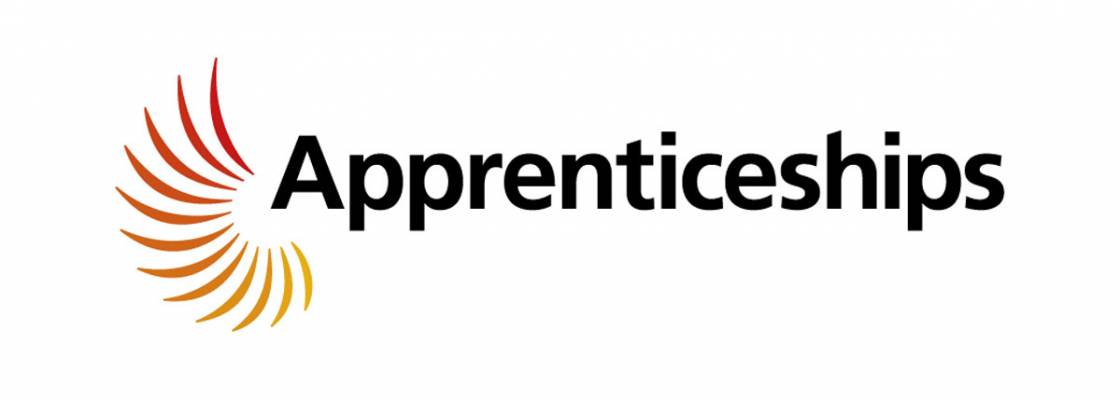
What you will study
Different levels
Prior knowledge, skills and behaviours can exempt individuals from certain elements of the programme, resulting in different entry levels and learner journeys for the apprentices.
Year 1
Year 2
Year 3
Year 4
Final year
Year 1 introduces key environmental science concepts and methods of scientific investigation.
Core modules
Introduction to Physical Geography and Environmental Hazards
30 credits
This is a Level 4 module for Geography and Environmental Science students. Core lectures introduce key fundamental topics in physical geography, overviewing the various spheres of the Earth, associated processes and interaction.
Themes are presented systematically as a cross-section of the Earth's physical structure: geological underpinning, Earth surface processes (introducing geomorphology, the pedosphere and hydrosphere), the atmosphere, and the biosphere. Interwoven within these topics will be lectures on associated environmental hazards, including geophysical hazards (e.g. volcanic eruptions, earthquakes and tsunamis), atmospheric hazards (including hurricanes and tornadoes) and environmental and ecological hazards (including oil spills, mine contamination and wildfires). The processes behind these major natural and man-made environmental hazards will be described, with reasons provided for their occurrence and global spatial distribution. Detailed case studies will be provided for each hazard, from a variety of geographical regions, in order to build a portfolio of examples, enhancing your knowledge of the processes, impacts and means of forecasting and mitigating against the hazards becoming disasters.
The module is a pre-requisite for Level 5 environmental and geographical modules: Geomorphology and Geophysical Hazards; Land Water and the Environment; Ecology and Conservation. The module introduces you to the application of geophysical knowledge and skills and potential discipline-related employment opportunities and alerts you to a range of transferable employability skills that will be developed throughout the module. These include discipline-based skills by identifying applications of geophysical knowledge to real world challenges and transferable skills developed in the learning activities and related assessments.
Research and Fieldwork Methods
30 credits
This is a module for all Level 4 Geography and Environmental Science students. The module introduces a range of generic and discipline specific research and fieldwork methods. Students are introduced to their course learning aims and identify their learning targets from Induction to graduation and their alignment to their learning pathway. Students are tutored in a range of learning techniques (e.g. critical thinking and communication skills) and are introduced to assessment for learning and the role of feedback, reflection and feedforward as an integrated part of their learning journey. Students are introduced to a range of research methods that form the basis of successful investigations in their subject areas, including research design, information acquisition, qualitative and quantitative analysis and critical interpretation.
Year 2 you will learn in a variety of environments including the classroom and laboratory and develop fundamental fieldwork skills. You will study environmental systems and the nature and consequences associated with environmental change. You will investigate how people interact with their environment and examine sustainability challenges. You will learn to make accurate observations of environmental phenomena in the field and the laboratory, and evaluate your findings.
Core modules
Digital Earth and Spatial Analysis
30 credits
Digital Earth: Spatial Analysis introduces and develops the fundamental geographical skills of data collection, analysis and presentation and the solving of spatial problems using GIS. It concerns data types, representations of reality and key spatial analysis techniques. GIS-based skills are important employability skills for geography and environment students with many course-relevant employers requiring a working knowledge of GIS and the application of GIS to solve real world geographical and environmental challenges. Digital literacy employability skills will be introduced and developed in this module and the module will provide a baseline for those taking GG5155 Cartography, Remote Sensing and Spatial Analysis at Level 5 and GG6140 GIS: Transforming Geography and Environment at Level 6.
Understanding the Environment
30 credits
This is a Level 4 module for Environment Science students. The module will investigate basic environmental principles, introduce environmental systems and identify and understand how physical and human processes can promote change in environmental systems at a range of spatial and temporal scales. Students will investigate the impacts of environmental change, understand their significance and show how this knowledge can be applied to the management of environmental challenges. The importance of a holistic approach to problem solving in the environmental sciences will be introduced along with material on key underpinning scientific disciplines including environmental chemistry and ecology through the investigation of global habitats. Environmental sustainability will be examined and debated within a broader sustainable development setting and students will define and debate anticipated 21st Century environmental challenges and the application of Environmental Science to these challenges. A range of employability skills will be emphasised throughout the module curriculum and students will be challenged to consider and articulate how their environmental knowledge and skills learning development can be applied to real world environmental problems.
Year 3 builds knowledge of environmental systems. You will develop your practical skills such as environmental project management. You will also learn to design and manage an environmental research project in the UK.
Core modules
Land, Water and the Environment
30 credits
First, an understanding of the fundamental principles of soil science is developed whereby the various soil properties and processes, including storage and transport of water in soil, are explained. This provides a good underpinning to developing an understanding of hydrology. Core principles of hydrology are explored both as theoretical physical science of hydrology and practical hydrological skills, which you will gain through hands-on experience and investigations. This knowledge of soil and water sciences forms the essential base for introducing and explaining environmental pollution, including the impact of pollutants on environmental systems (soil, water, plants and air) and human health. It also discusses pollution mitigation and control strategies. Core learning material is provided via Canvas VLE with lectures that are designed to explain fundamental principles and concepts. Employability skills are embedded within the module and specifically include field and laboratory skills that are designed to develop surveying, recording, measuring, sampling, laboratory testing, data analysis, data interpretation and presentational skills.
Design and Management of Environmental Projects
30 credits
This module is core for all Level 5 Environmental Science students and forms a bridge between Level 4 GG4090 Research and Fieldwork Methods and Level 6 GG6400 Research Project.
1) Students design, manage and execute an environmental science or environmental hazards research project in a 'real-life' field-based setting. Students are tutored in aspects of research design: defining research questions, research philosophy and appropriate methodologies. Students learn practical aspects of research design such as logistical considerations of time and budget limitations as well as data archiving (including digital and mobile technology) and location-based analysis. They will design and manage a field-based research project in a UK and/or overseas setting.
2) A Personal Tutorial System (PTS) will run in parallel to the taught elements of the module whereby students will integrate and develop their learning from this module to the wider academic and professional/workplace context. The PTS will emphasise key employability skills that will be acquired through the production of the research projects and their relationship to employability skills in other Level 5 modules. This will assist those students wishing to take a sandwich year and prepare those students and provide a development platform for the production of an independent research proposal. On completion of this module, students will have gained first-hand experience of research project design and management as a pre-cursor to their Level 6 Independent Research Project and/or work placement
3) Students will learn how to collect, manipulate and interpret statistical environmental data and apply this learning to their project-based investigations.
Year 4 develops your analytical science skills portfolio through the collection, analysis and interpretation of environmental data. You will develop your practical skills such as environmental project management, cartography and Geographic Information Science.
Core modules
Cartography, Remote Sensing and Spatial Analysis
30 credits
Maps are tools for visualising geospatial data to communicate spatial patterns and processes and the results of geographical analysis. This module explores the principles of map design and production in a GIS environment. It introduces ground, aerial and space based surveying, exploring the underlying physical principles and geographical/technological concepts. It covers remotely sensed data capture, image processing and data modelling. The third element develops skills in spatial data analysis and modelling and to explore the application of techniques with respect to point patterns, spatially continuous data and area based data.
Ecology and conservation
30 credits
This is a core module for the Environmental Science course and builds upon the foundation of Level 4 GG4080 Introduction to Physical Geography and Environmental Hazards. Ecological concepts are explained using a hierarchical approach: population, community and ecosystem levels of ecology are explored, highlighting the interactions between humans and nature. A research-led approach is used to emphasise the models by which ecologists attempt to explain complex biological systems. Current issues in biodiversity and conservation are explored through a lecture and seminar programme. The lectures are supported through fieldwork and field-based investigations. Core knowledge is provided with keynote lectures used to explain concepts. The fieldwork elements are designed to develop observing, recording, data analysis, data interpretation and presentation skills. The module provides a bridge to students wishing to develop their ecological knowledge and skills at Level 6, in particular GG6400 Research Project and GG6140 GIS: Transforming Geography and the Environment.
Final year modules build on your environmental knowledge and skills delivered in previous years, enabling you to apply your knowledge to investigate contemporary environmental science challenges. Your final year independent research project will reflect your personal environmental interests and help you develop your employability skills.
Core modules
GIS Transforming Geography and Environment
30 credits
This module has a twin focus on changes that have impacted on Geography and Environment over recent decades and how these have created opportunities for geographical and spatial investigation to address an expanding range of applications. Information technology, in particular GIS, is one of the major drivers of change and this module explores the application of GIS in a range of domains encompassing socio-demographic, economic, political, environmental, natural and anthropogenic hazard events.
Land and Water Resources Management
30 credits
The module examines the relationship between land and water management, global challenges associated with the management of land and water, and sustainable options to seek their resolution. The module will develop an understanding and critical evaluation of these challenges from several perspectives through the systematic investigation of land-use practices, the applications of soil science and linking practices to processes and patterns of land degradation, the interface between land management and water management, global concerns for water security, land use impacts on the wider environment, including climate, physical and socio-political drivers and an examination of the regional land-water management issues.
The Challenge of Climate Change
30 credits
This is a core Level 6 module for all Environmental Science and Environmental Science, Disasters and Management Students. This module tackles the key issues relating to climate change in the three main subject areas of science, policy and society. It aims to provide you with an understanding of the key concepts and processes of climate change and the various ways in which societies can respond. Core factual material is provided via Canvas with keynote lectures, seminars and workshops used to explain concepts. Fieldwork sessions are designed to complement the lecture series and give further practical demonstration of policy and practice complexities.
Research Project
30 credits
The module is core to those on the geographical and environmental courses. It provides experience in the design, execution and preparation of an independent but approved programme of research. Furthermore, through the Personal Tutorial System (PTS) it encourages you to employ reflective learning techniques and to develop a variety of level-appropriate employability skills by engaging with their research project as a piece of academic research with commercial, policy or political value which requires effective dissemination and communication to a range of suitable audiences. Employability skills developments are integral to the Research Project module. The specific nature of the research project chosen allows you to target specific skills you wish to develop in your learning pathway and the PTS will work closely with you to identify and articulate these skills through the associated module assessments.
Please note
Optional modules only run if there is enough demand. If we have an insufficient number of students interested in an optional module, that module will not be offered for this course.
Accreditation
This programme is accredited by Institute of Environmental Management and Assessment (IEMA) and has been designed in accordance with IEMA profession standards.
Entry requirements
Teaching and assessment
Who teaches this programme?
The programme is taught at the Faculty of Engineering, Computing and the Environment. Faculty staff have a wide range of experience across research and industry and continue to practice and research at the cutting edge of their discipline. This ensures that our programmes are current and industry informed ensuring you get the most relevant and up to date education possible.
Staff will use their experience and professional networks to hone your skills and shape you into the next generation of science, technology, engineering and mathematics (STEM) graduates.
Postgraduate students may run or assist in lab sessions and may also contribute to the teaching of seminars under the supervision of the module leader.
End-Point Assessment (EPA)
Each apprentice on an approved Apprenticeship Standard is required to take an End-Point Assessment (EPA) to complete the programme. The EPA is delivered by an End-Point Assessment Organisation (EPAO) that is registered with the Education and Skills Funding Agency (ESFA).
The EPA is either integrated as part of the apprenticeship or completed after the course element. If an apprentice is completing the EPA after the course element, they must ensure they have successfully completed their learning, achieved the gateway requirements and finished uploading their evidence prior to taking the EPA.
Local Employer Group (LEG)
The LEG was established to monitor, support and enhance the delivery and operation of the programme. This includes management and periodically reviewing of work-based learning by this established local employer group with the aim of delivering an apprenticeship programme that is a high-quality satisfactory experience for all. Representatives of apprentices are invited to serve on the group. Terms of reference include:
In advance of each group meeting, the course administrator asks the apprentice representative to gather feedback from their fellow apprentices to be channelled through them at the meeting.
Facilities
There is a wide range of facilities for practical work at our Penrhyn Road campus, where this course is based. You will have access to a modern environment with the latest equipment, including:
- laboratories dedicated to environmental science learning and research
- the £9.8 million Eadweard Muybridge building with state-of-the-art laboratories
- computing laboratories and a team of IT technicians to offer assistance
- the award-winning Town House, with a well-stocked library that boasts an impressive collection of texts, journals and online e-books/journals
- excellent social spaces, plus a large, fully equipped gym and fitness centre
- a fully integrated virtual learning environment (Canvas) so you can learn and interact with others on your course 24/7
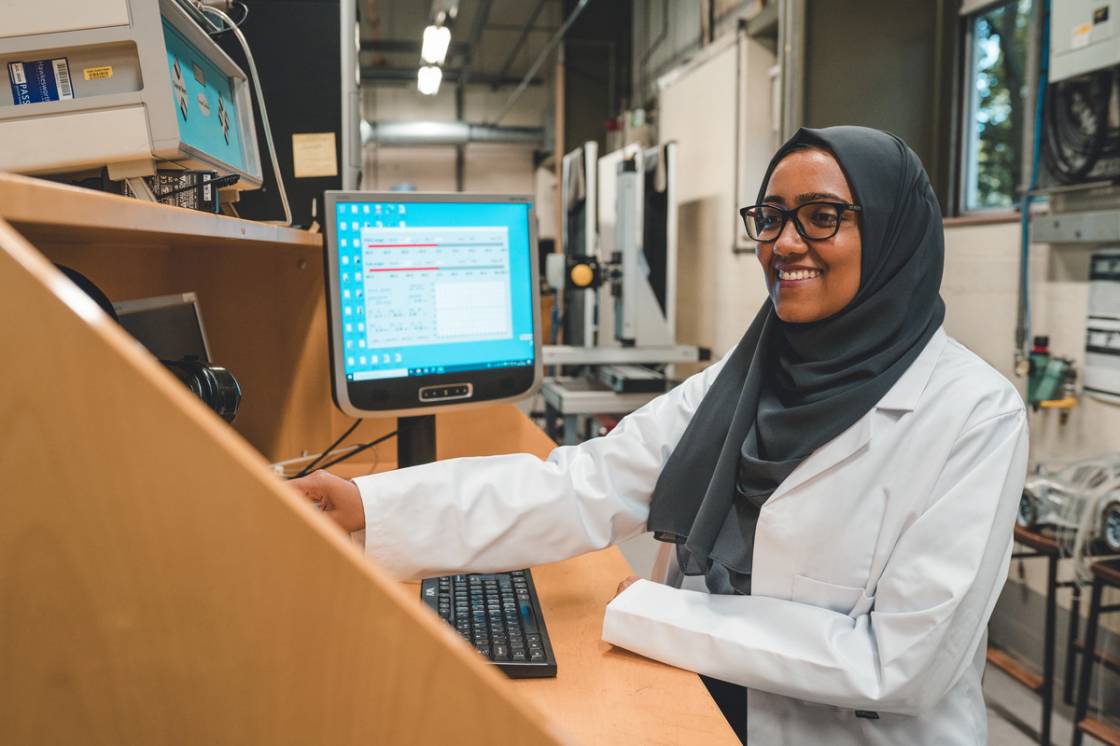
Next steps
Employees
If you are currently employed full time and would like to find out more about apprenticeships, please ask your employer to contact the Kingston University apprenticeship team.
Employers
If you are an employer interested in how apprenticeships can support your organisation and employees, please contact the apprenticeship team for further details.
Course changes and regulations
The information on this page reflects the currently intended course structure and module details. To improve your student experience and the quality of your degree, we may review and change the material information of this course. Course changes explained.
Programme Specifications for the course are published ahead of each academic year.
Regulations governing this course can be found on our website.



